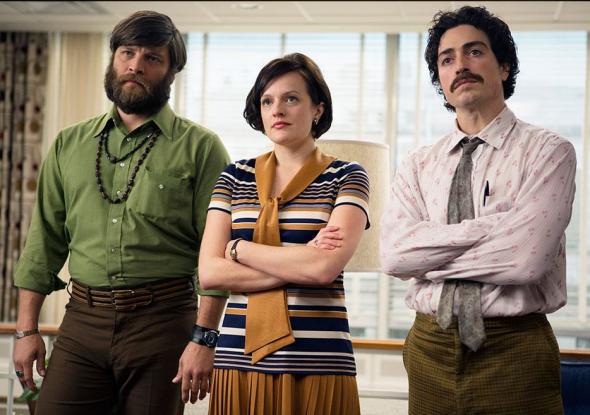Willa, Julia,
Was this Mad Men’s first attempt to dramatize the computer revolution? If so, I think we now have a fairly decent sense of where Matthew Weiner stands when it comes to technology: preferably over a pile of its broken shards.
A megacomputer has arrived at SC&P, and this disruption comes at the behest of hard-hatted Harry Crane and Jim Cutler—the show’s two most comically evil personae. Meanwhile, the displaced victims (losing their creative lounge, or as Harry patronizingly terms it, “lunch room”) include those lovable ragamuffins Rizzo and Ginsberg. It’s pretty clear which side we’re meant to be rooting for. “What man lay on his back counting stars and thought about a number?” asks Don, framing it as a battle between philosophy and bean-counting.
With his short-sleeve work shirt and pocket protector, Lloyd, the tech nerd who’s overseeing the installation of the punch-card behemoth, could be right out of NASA Mission Control. He symbolizes the dramatic late 20th-century workplace shift toward empiricism and discipline and away from gut calls and morning cocktails. (Recall that MBA from Butler Footwear who had no time for drinks with Joan and thought he could math his way to a marketing plan.) Our new computer guy isn’t even sure whether advertising has an empirical purpose. “Does it work?” he asks Don with genuine curiosity, as though he wouldn’t be the least surprised to hear that it’s pure hokum.
Tearing up the SC&P creative lounge to replace it with a giant calculator seems like the sort of ham-handed metaphor that this show would generally eschew. In an effort to inoculate itself against charges of on-the-nose-ness, the script calls for its characters to address the issue directly. “It’s not symbolic,” promises Harry of the change. “No, it’s quite literal,” replies Don.
But symbolism hinting at the technological leaps on the horizon in fact dominates this episode. There’s the aforementioned elephant (or rather, computer) in the room (or rather, lounge). But also note that when Don first enters the office, he sees the handset of a rotary phone swinging uselessly. Later, Don throws his typewriter, another doomed gadget, in a violent fit of frustration. And the entire episode, titled “The Monolith,” is one long tribute to 2001: A Space Odyssey, as detailed elsewhere in Slate. The 1968 film portrays a mysterious futuristic object as a font of major evolutionary advancements—in monkeys and machines—and I wondered if that monolithic mainframe being wheeled into SC&P would spur some sudden evolvement in Don.
The episode’s onslaught of metaphors extended to Don’s latest rough patch. Consider the pocket-protected fellow’s description of the computers he installs: “I’ve worked with these machines. I know how resilient they are. I don’t want to see them in a junkyard in two years.” He might as well be talking about the aging piece of office hardware known as Don Draper, a man currently being tossed into the junkyard by his own colleagues.
But will Don show resilience? Again, we merely need to look for symbols. Perhaps our answer lies in that premonitory Mets pennant—the one that belonged to poor, cursed Lane and which Don retrieves from under a cabinet and affixes to his office wall like a sigil. The 1969 Amazin’ Mets, just getting their season started and attempting to atone for the previous year’s dismal ninth place finish, would go on not only to record the franchise’s first-ever winning season but also miraculously win the World Series.
A few questions for you two:
- Are you ready for yet another go with Don as he attempts to right his ship and defeat his demons? The sequence in this Season 7 episode in which a chastened Don drinks some coffee, gets a Freddy Rumsen pep talk, and applies himself to his work with renewed vigor could have come right out of Season 4, when a chastened Don attempted to cut back on his drinking and started swimming laps at the New York Athletic Club. The music over the closing credits was the Hollies’ “On a Carousel,” and those lyrics—“Round and round and round and round and round / And round and round and round with you”—sure describe where we’re at with Don at this point. Are you still entertained by this repetitive ride?
- When Peggy broke into a self-satisfied smile after she thought she’d expertly managed Don—treating him like a junior copy peon—it was the first time I ever found myself rooting against her a little bit. I thought she was too pleased with herself for putting Don in his place. (Don actually showed impressive restraint in the moment, though he later turned childish.) She didn’t handle that delicate demotion well. She needed to soften Don’s professional setback better. Or am I being too hard on her? “You’re in charge, sweetheart,” as Lou puts it, suggesting the hazardous path she’s negotiating between being a boss and being a woman.
- What did you make of Roger’s visit to the commune? He seems fine with it all, even smoking dope and appreciating the starry sky, right up until “Marigold” exercises a little promiscuous freedom. Perhaps fathers are doomed always to get weird when it comes to their daughters’ sexuality? I noted that Roger calls the commune “Shangri-La,” which reminded me that Don watched a movie about Shangri-La when he visited Megan in Episode 1 of this season. Roger’s daughter is on the cutting edge of Tom Wolfe’s “Me Generation”—and it’s less the reality of her selfishness that sets Roger off than her lack of apology for it. “I’m sorry but you don’t get to do that,” he says to her, somewhat enviously, speaking from the generation that hid in the bathroom with its pint of gin to the generation that claims self-absorption as a virtue.
I’ll get Cletus to drive me to the train,
Seth
Read all of Slate’s coverage of Mad Men.
